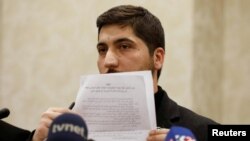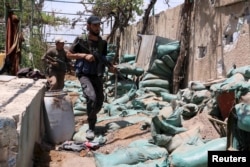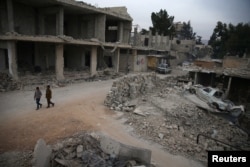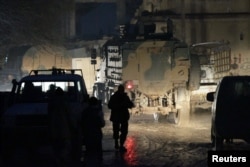Much remains unclear about the nationwide Syrian cease-fire that Russian President Vladimir Putin announced Thursday — a truce that Moscow says can pave the way for Russian-brokered talks on a settlement of the five-year-long war.
But Turkey's participation gives the cease-fire added significance, say Western diplomats, who have been sidelined by the deal. Ankara can do much to strangle rebel militias that break the cease-fire, having the ability to block arms resupplies crossing its border.
The Syrian National Coalition, the main Western- and Gulf-backed political opposition group, said it would abide by the truce but warned it would respond to cease-fire violations.
The coalition issued a formal statement later Thursday, saying it could count "on all parties to work to ensure the success of the cease-fire agreement and to abide by its terms." But the coalition warned that it feared "Iran will attempt to undermine the agreement as it seeks to further escalate the violence in Syria."
It added: "The coalition confirms that the FSA groups will abide by the cease-fire agreement, but will reserve the right to respond to any violations by regime forces and the Iranian militias who violated all previous cease-fire agreements."
Abiding groups
Russian officials released a list of rebel groups that have so far signed on to the cease-fire deal. They include Faylaq al-Sham, Ahrar al-Sham, Jaysh al-Islam, Thuwwar Ahl al-Sham, Jaysh al-Mujahidin, Jaysh Idlib and Al-Jabhah al-Shamiyah. Their apparent agreement is testimony to Turkish influence.
"The big difference is the role of Turkey," said a Western diplomat based in Ankara.
He and other diplomats say the latest development is part of an unfolding process that has Moscow, Ankara and Tehran increasingly working to plot a mutually beneficial end to the war that could see Syria, in effect, diced into separate zones of influence, although Russian officials insisted Thursday there will be no partitioning of the war-ravaged country.
It was deal-making between Russia and Turkey that cleared the way for the final evacuation of rebel fighters and civilians from eastern Aleppo earlier this month. Moscow and Ankara agreed to several cease-fires that failed, but a final one held, allowing the completion of evacuations of tens of thousands from the city's eastern neighborhoods.
Iran and Russia share an interest in ensuring the survival of Assad regime, a long-term ally of both Moscow and Tehran. For Turkey, the ouster of President Bashar al-Assad has taken a back seat to blocking the emergence of a Kurdish state in northern Syria, the very existence of which would encourage Kurdish separatists in Turkey itself, fear Turkish officials.
"As is known, we have long been working hard to launch negotiations between the regime and the opposition for a comprehensive political resolution of the conflict, to cease violence and to provide humanitarian aid. As a result of our efforts, an agreement between fighting parties in Syria to begin a cease-fire as of 00.00 on Dec. 30, 2016, has been reached. We welcome this development," Turkey's Foreign Ministry declared in a written statement released Thursday.
Geographical considerations
The agreement stipulates the cessation of all armed attacks, including airstrikes. No group — including the Syrian regime — should try to make territorial gains.
"Groups deemed terror organizations by the U.N. Security Council are excluded from this agreement," Turkey's Foreign Ministry stated, adding that Turkey and Russia would act as joint guarantors overseeing the cease-fire. The deal, in effect, would exclude the Islamic State terror group and al-Qaida-linked Jabhat Fateh al-Sham, the armed group formerly known as the al-Nusra Front.
There also are exclusions of certain geographical areas. Labib Nahhas, a spokesman for Ahrar al-Sham, a powerful Islamist rebel group, told the AFP news agency, "Russia wants to exclude Eastern Ghouta from the cease-fire, which is not acceptable." Eastern Ghouta is a rebel-held suburb of Damascus.
Leaders of the Western-backed Free Syrian Army say Russia also is insisting on the exclusion from the cease-fire of rebel-held Douma, 10 kilometers northeast of the Syrian capital, Damascus.
The exclusions are prompting rebel leaders to complain that Moscow and the Assad regime are gerrymandering the map, excluding areas they want to move on while prohibiting' rebels from trying to seize territory important to them.
"The agreements reached are, of course, fragile, need a special attention and involvement," Putin acknowledged Thursday when announcing the truce. One key challenge will rest in persuading foreign Shi'ite militias, including Hezbollah, the Lebanese movement, to observe the truce.
Remaining issues
On Thursday, Turkish Foreign Minister Mevlut Cavusoglu called for Hezbollah to be withdrawn from Syria altogether, though analysts say it is unlikely Hezbollah commanders will want to withdraw their forces from the strategic mountainous Qalamoun region running adjacent to Lebanon's Beqaa Valley.
Another major challenge for the fate of the cease-fire will rest with the course of any subsequent peace talks. Turkey says it backs political negotiations between the regime and opposition groups in Astana in mid-January. But Turkish officials say they will not sit at a table with Assad's representatives or discuss anything directly with them. The Turks say they still don't believe a political transition can occur while Assad remains in power.
"We have not negotiated the al-Assad issue," Cavusoglu said. He indicated for now that to ensure a cease-fire takes hold, Ankara is prepared to leave aside Assad's future. Another wrinkle could well come with Ankara's insistence that the Kurdish People's Protection Units, or YPG, be excluded from proposed peace talks in Astana.















